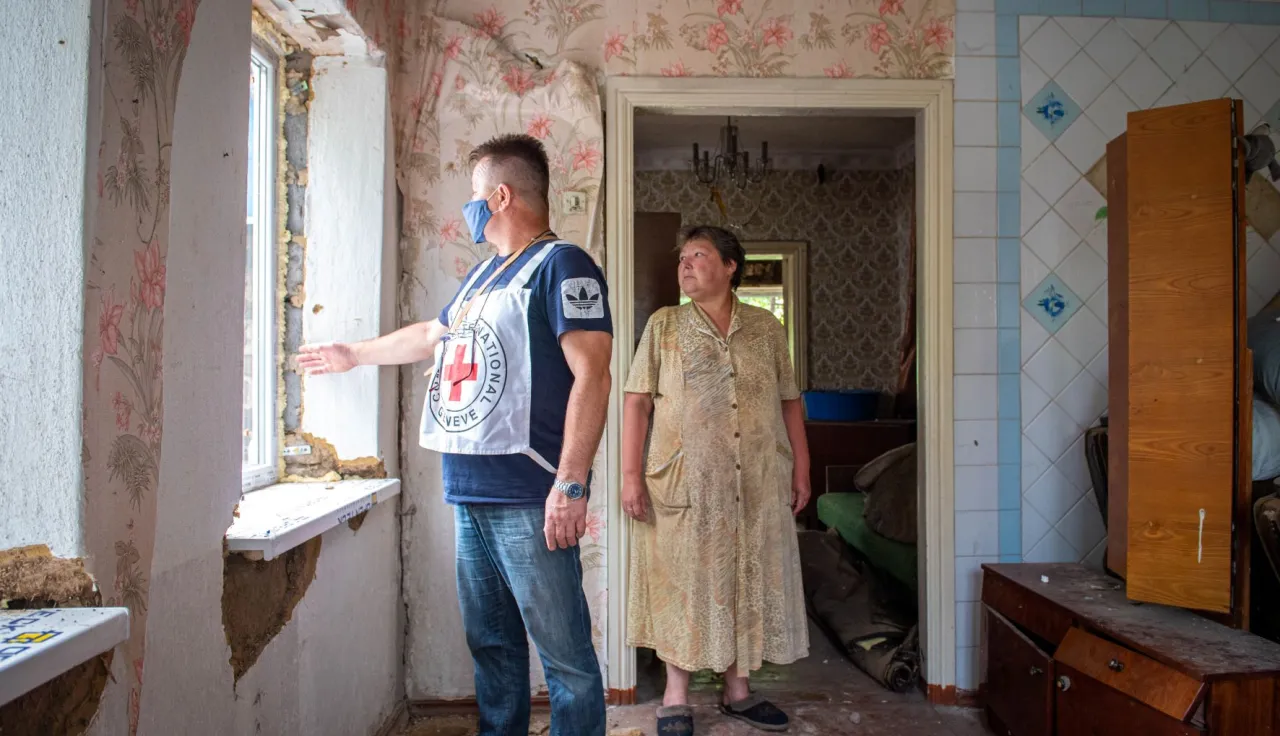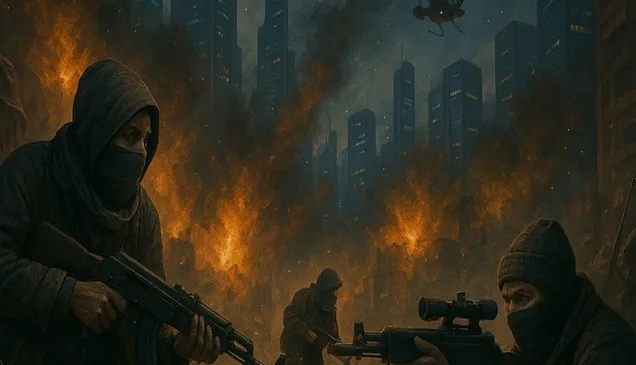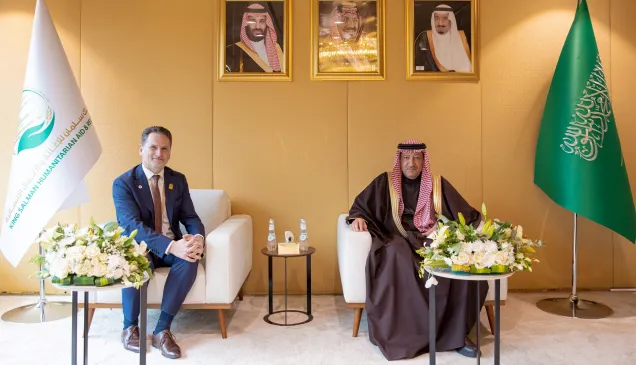Peter Maurer: "Effects of war are set to fester without decisive leadership"

War and instability shatters nations: from the immediate impact of the hostilities to the decay of infrastructure and social systems. Political will to find practical solutions is imperative to prevent humanitarian consequences of conflict and enable humanitarian action.
Speech given by Mr Peter Maurer, President of the International Committee of the Red Cross to the OSCE Permanent Council — 16 December 2021
Honorable Chair,
Excellencies,
Dear colleagues,
Thank you for inviting me once again to share the ICRC's humanitarian perspective. I appreciate the ongoing dialogue between my organization and the OSCE as a regional actor as well as an important gathering of state representatives with engagements and influence well beyond the region.
My focus today will naturally be on the humanitarian consequences of armed conflict inside the region and the challenges in addressing them. Before doing so, however, I would like to cast the net more widely to reflect some of the fundamental challenges we are facing in protecting and assisting the most vulnerable: ensuring space for humanitarian action and respect for IHL. Looking at the deliberations at the recent OSCE Ministerial Council, I have no doubt that you are familiar with and can relate to our concerns.
For instance, the ICRC took good note of the Ministerial Decision on Climate Change and the way in which you decided to embrace climate as a threat multiplier in your considerations for maintaining stability. Many countries witnessing armed conflicts also face severe climate change.
Climate shocks create accumulated and intersecting challenges for affected populations. Combined with the burden of conflict, communities struggle to anticipate, mitigate and recover from these shocks.
The ICRC has been working intensively to factor this into its humanitarian response, and we look forward to deepening the conversations with you also in this regard: in terms of programming, financing adaptation and partnering with development sector and humanitarian actors is of critical importance to cope and respond to the destabilizing effect of climate change.
We also took good note of the discussions concerning the situation in Afghanistan and the implications for OSCE action. As you know, the ICRC engages with governments and other actors on a wide range of topics. Regardless of the issue at stake, we always base our observations and recommendations on our first-hand experiences on the ground, and our direct engagement with affected populations.
During my visit to Afghanistan earlier this year, I saw first-hand how an already difficult situation has degraded into an acute man-made humanitarian emergency with potential for large scale impact on the security and stability of neighbouring countries and beyond – including members of the OSCE.
What we witness in Afghanistan today is that policies meant to punish those in power are instead freezing millions of Afghans out of the basics they need to survive.
Banks are struggling to function, and salaries are not being paid. Afghanistan's health system is on the verge of collapse and has recently struggled to deal with the consequences of conflict, lack of funds as well as the ongoing COVID-19 pandemic.
Cash shortages within the country concretely mean that health facilities are not able to pay for fuel to run their generators, ambulances can't run, there isn't food for patients, and salaries have not been paid to health care workers for the past three months or more. People continue to be injured by mines and explosive remnants of war placed on main roads, destroyed houses and their surroundings.
In as much as these policies can unintentionally multiply needs, they also can make it harder for humanitarian actors to respond in an appropriate and timely way. They can also destabilize a whole region. As it stands, UNSC resolution 1988 contains certain prohibitions that have adverse effects on humanitarian operations.
The coming weeks are a crucial window to act. The ICRC is asking for a "humanitarian carve out" that would allow us to deliver our mandate without any fear of violating sanctions. Donors, suppliers and banks would also feel reassured as our activities would be expressly excluded from the scope of sanctions.
Humanitarian programs cannot be a band-aid for a broken system.
The responsibility of States does not end at ensuring a pipeline of goods but to must also address the underlying support for essential services such as hospital systems, water authorities, sanitation, and a financial system that can support livelihoods.
States must invest in Afghanistan. This is the only way to prevent a total collapse of the banking system and essential services like health care and education. This is the only way to avoid rapidly erasing any development gains made through previous investments over the last two decades.
The fighting may have come to a halt, but the long-term effects of war are set to fester without decisive local, regional and international leadership.
Allowing instability is likely to translate into uncontrolled migration, illegal and illicit trafficking and eventually further security risks.
Humanitarian Protection Challenges Across the OSCE Region
The importance of preserving the space for neutral, independent and impartial humanitarian action at all times, ladies and gentlemen, is also one of the core lessons from our presence in the OSCE region – which I would like to turn to now: Ukraine, the Caucasus, the Balkans as well as Moldova continue to struggle with unresolved conflict or its legacy. In active or recent conflict settings we are witness to:
- The primary impacts of hostilities on people's physical and mental health, their livelihoods as well as critical infrastructure;
- The harm caused by weapon contamination in populated areas;
- The lack of access to essential services such as health, water and electricity services, but also education; and
- The needs of those most at risk, including the elderly, children, displaced and detained persons.
And not to forget one of the most tenacious humanitarian tasks that haunts these contexts as well as the Balkans decades after the war has come to an end:
- The search for missing persons to bring peace to families and communities.
In Ukraine, we have unfortunately seen an increase in hostilities along the line of contact in Donbas throughout 2021 compared to the period of relative calm following the July 2020 ceasefire agreement. The conflict is not frozen. It's an active conflict taking place in densely populated areas with ongoing hostilities.
Though the overall number of civilian victims remains at lower levels than in previous years, the conflict continues to inflict heavy humanitarian consequences on people's lives, well-being and prospects.
Damage to essential infrastructure such as water, gas and power supplies – (exacerbated by the use of explosive weapons) - have caused cuts and shortages, with huge knock-on effect for communities, far beyond the immediate area for fighting.
The measures taken to fight the pandemic have, unfortunately, increased people's vulnerability and exacerbated the humanitarian situation in the Donbas further. What has always been an arduous journey with hourlong queues in close proximity to the active frontline, surrounded by explosive remnants of war and landmines, has now become even more prohibitive:
In October 2021, only 30'000 crossing were registered compared to more than a million per month pre-pandemic. The impact is felt most severely by the elderly and those who depend on crossing to access services and pensions or to see and support family members living on the other side of the conflict line.
The ICRC welcomes either side's commitment to facilitating the crossing of civilians and calls on all to ease and adapt existing procedures to the realities of those needing to cross, including the most vulnerable among them.
As a minimum, this would mean adapting procedures and increasing capacity to process requests timely and more efficiently, as well as to offer support or alternatives to the digitally illiterate. Sanitary restrictions should reflect the evolution of the pandemic situation and not be applied excessively and indefinitely.
Technicians and the necessary equipment must be able to move freely to ensure the maintenance of essential infrastructure and services. Essential infrastructures must be protected from direct and indirect harm as long as the conflict persists.
Talking about the most vulnerable, we should not forget those detained. In Ukraine, visits to places of detention and persons deprived of liberty constitute one of our key operational priorities and we remain in confidential bilateral dialogue with all those that can and should provide access to people in need of help. As anywhere in the world, our visits aim to ensure adequate living conditions for all detainees, that they are treated humanely and in line with international standards and that they can maintain contact with their families.
After almost three decades, tens of thousands of people need support rebuilding their livelihoods and homes affected by the Nagorno-Karabakh conflict. Tens of thousands are displaced. Thousands of families are still waiting for news of their missing loved ones. Infrastructure has been damaged, including dozens of schools. Land that has been left contaminated with mines and explosive ordnances is dangerous for civilians – especially farmers and children.
As the ICRC Vice President, Gilles Carbonnier, told me following his recent visit, the humanitarian consequences of last year's escalation compound the impact of the past three decades of conflict.
We know that the work doesn't stop when the fighting does. People are still in need of support, security, safety and assistance. This includes those detained in relation to the escalation as well as those captured last month. The ICRC continues to visit them and supports them in keeping contact with their families.
One of the long-term humanitarian challenges I alluded to above relates to the issue of missing people.
The Search for Missing Persons
In Ukraine, more than 800 persons remain unaccounted for, out of a total of 18'500 missing persons registered with the ICRC and the Ukrainian Red Cross Society in the beginning of the conflict.
Across the Caucasus, families continue to wait in anguish for information about the fate and whereabouts of their loved ones.
In the Western Balkans, families of over 10,000 missing persons still live in uncertainty almost thirty years after the conflict and identification rates are declining fast.
Families have a right to know, and we know from experience that they are also in need of economic, social and mental health support. We also know from experience that resolving the issue of missing persons can be a crucial enabler for reconciliation and trust.
The ICRC has been working together with the Red Cross and Red Crescent societies for decades to identify missing persons and offer much-needed support to the families. Ultimately, it is the responsibility of states to cater to their citizens' need to know. There are many ways you all can support these efforts to bring answers to the families of the missing across the OSCE region:
- You can ensure that the search for missing people is treated as a genuine humanitarian concern that is separate from political or investigative considerations.
- You can increase your political and financial support to national institutions in charge of the Missing file so that they have sufficient means and capacities to carry out their mandate.
- You can ensure that the rights and interests of the families of missing persons are protected by law.
- And, you can order your military, police and security agencies to search their own records and archives and hand the relevant information over to the mechanisms.
Conclusions: OSCE – ICRC complementarity
As 2021 draws to a close, I want to impress on you once more that war and instability shatter nations: from the immediate impact of the hostilities, to the decay of infrastructure and social systems. While political considerations should not interfere with humanitarian action, the political will to find practical solutions is imperative to both prevent humanitarian consequences and enable humanitarian action.
The norms and principles on which the international system is based need greater adherence. States should never underestimate the power they have to use their influence in supporting respect for the law and for humanitarian principles.
The states I see represented here today have enormous potential to build stability and alleviate the suffering of millions of people within and beyond the OSCE region. The ICRC and OSCE are among the few, if not only, international organizations present on the ground in the region's conflict settings and contested areas.
While our mandates may differ, the humanitarian suffering that we witness in these areas is our common concern. The underlying objective for our respective actions should be to put human needs at the centre, while working across humanitarian, security, stability and peace-building agendas.
Your contribution as OSCE participating states will be to:
- Ensure that International humanitarian law is respected, by all sides and at all times;
- Conceive of restrictive measures or sanctions in a way that does not unduly interfere with impartial, neutral and independent humanitarian action;
- Put in place and implement relevant laws which support humanitarian aid and protection;
- Ensure that humanitarian action is adequately resourced, and
- Enable a public discourse that does not politicize or criminalize humanitarian action.
In turn, you can trust that the ICRC will continue to do its utmost to:
- Provide neutral, impartial and independent humanitarian support to affected populations; and
- Offer States our services as a neutral and discreet intermediary to work towards humanitarian outcomes, which can be essential steps to building trust in contested situations.
Thank you very much for your attention.



